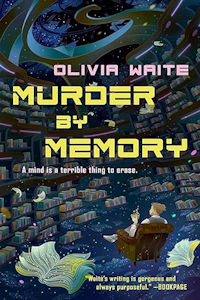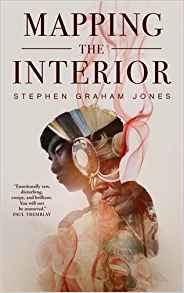Murder by Memory by Olivia Waite: Review by Paul Di Filippo
 Murder by Memory, Olivia Waite (Tordotcom 978-1250342249, hardcover, 112pp, $21.99) March 2025
Murder by Memory, Olivia Waite (Tordotcom 978-1250342249, hardcover, 112pp, $21.99) March 2025
Should a mystery be deemed “cozy,” almost by definition, if it contains a yarn shop and some interesting talk about knitting that actually proves to be a central clue? What if that yarn shop is located on a gigantic interstellar generation ship named Fairweather—helmed naturally by an AI dubbed “Ferry?” And what if one of the interlocutors in the knitting conversation is hundreds of years old in her essence, but currently inhabiting the body of a twenty-something woman? I suspect that by this point, any suitability of the label “cozy” is going to have to be stretched pretty far. And yet there remains some sense that Olivia Waite’s first venture into SF (she is primarily known in the romance and fantasy genres) does retain, amidst its solid speculative elements, a sense of the British manor house.
The first thing to know about Waite’s scenario is that she has established a clever idea that I don’t recall seeing before. Everyone knows that slower-than-light starships, taking centuries to reach their destination, are plagued by generational turnover, leading to systemic breakdowns and cultural ignorance. But what if the passengers and crew were more or less immortal? Hopefully knowledge and a sense of purpose and dedication and memories would remain intact for the whole trip. How is that to happen? You just yoke that other great stefnal trope to the starship: uploading and downloading of personalities, decanted into freshly fabbed bodies. The Fairweather has a digital library of all its humans, updated frequently with new experiences. If you’re hurt or dying or old, you just layer on your latest memories to your library template, which then gets stuffed into a fresh young body, one based on your familiar somatype.
However, when our narrator, Dorothy Gentelman, wakes up anew, she finds herself inhabiting the body of one Gloria Vowell. Gloria’s psyche is suppressed, or perhaps even totally expunged. What could have caused this unprecedented breach of protocol? Dorothy learns quickly from Ferry: Wanting a rest, tired of life, Dorothy had decided to sit in the memory banks for a while, disembodied, and she’s been there two years. But her presence is suddenly required, and Ferry has taken the liberty of using the first body handy as her container—not quite a random choice, it turns out.
For there has been a murder onboard the ship, and Dorothy is the Fairweather’s official detective.
Dorothy quickly shrugs off the weirdness of her condition, and begins her investigation. She visits the quarters of the murder victim, Janet Dodds. The corpse is still present, apparently accidentally drowned in “memory cocktails,” a kind of virtual-reality-inducing potion. But Dorothy sees through the artifice and soldiers on. One important side-quest is to pick the brain of her nephew, Rutherford Talmadge IV, aka Ruthie. He’s possessed of a great but eccentric mind.
Oh, Ruthie was well-intentioned, even a genius in some very specific ways, but the boy had a talent for chaos that was an equal to the strong nuclear force. You could blindfold him, gag him, tie his hands, shackle his legs, put him in a room alone for five minutes—and when you returned Ruthie would still have found a way to lose all his money on a comet race or buy himself six shirts in a print so blindingly garish that lighthouses could use it in place of a beacon.
This is of course very Wodehouseian, but Waite does not layer on the homage too thickly, and the confection remains tasty.
From here it’s a zigzag trail among various strata of the ship, from one well-delineated venue to another. Ultimately, Dorothy uncovers a long-running illegal scheme involving immortality, but not foreseen and prevented by the ship’s founders. “Follow the money,” we discover, remains an operational maxim for any detective, even one who is centuries distant from our time.
Waite’s prose is light and galloping, and the book begs you not to put it down. Dorothy’s somewhat devil-may-care personality and her powers of ratiocination are the real engine of the narrative. The title’s allusiveness stems from the fact that to destroy a passenger’s upload is effectively to murder them. In this sense, I am reminded of John Varley’s “The Barbie Murders”. As Wikipedia comments about the Varley: “The motive turns out to be one only possible for a religion based on being identical to one another.” In other words, here and in Varley, the ancient art of murder assumes new guises when technology comes into play.
I note that the front matter of this book labels this to be the first Dorothy Gentleman adventure. I hope the Fairweather does not reach its destination until many more cases have been attended to by our sleuth.
Interested in this title? Your purchase through the links below brings us a small amount of affiliate income and helps us keep doing all the reviews you love to read!
 While you are here, please take a moment to support Locus with a one-time or recurring donation. We rely on reader donations to keep the magazine and site going, and would like to keep the site paywall free, but WE NEED YOUR FINANCIAL SUPPORT to continue quality coverage of the science fiction and fantasy field.
While you are here, please take a moment to support Locus with a one-time or recurring donation. We rely on reader donations to keep the magazine and site going, and would like to keep the site paywall free, but WE NEED YOUR FINANCIAL SUPPORT to continue quality coverage of the science fiction and fantasy field.
©Locus Magazine. Copyrighted material may not be republished without permission of LSFF.








